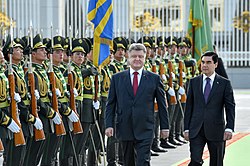Country Areas visited Date(s) Notes France Paris 11–12 January Unity March in Paris [ 36] Switzerland Zürich , Davos 19–21 January World Economic Forum Annual Meeting . President Poroshenko delivered speeches at the Europa Institute of the University of Zurich [ 37] and at the panel "The Future of Ukraine" in Davos . [ 38] [ 39] The trip was cut short because of the escalation of fighting in eastern Ukraine. [ 40] Saudi Arabia Riyadh 24 January President Petro Poroshenko took part in the funeral ceremony of King Abdullah bin Abdulaziz Al Saud . [ 41]
Poland Kraków , Oświęcim , Brzezinka 27 January President Petro Poroshenko took part in the commemorations marking the 70th anniversary of the liberation of Auschwitz . [ 42] [ 43] Germany Munich 7 February President Petro Poroshenko arrived to Munich to participate in the annual security conference . [ 44] [ 45] Belarus Minsk 11–12 February Meeting with Russian President Vladimir Putin , German Chancellor Angela Merkel and French President François Hollande hosted by Belarusian President Alexander Lukashenko . [ 46] [ 47]
Belgium Brussels 12 February President Petro Poroshenko joined the session of the European Council at the invitation of the President Donald Tusk , held meetings with President of the European Commission Jean-Claude Juncker , Prime Minister of the UK David Cameron . [ 48] [ 49] [ 50] UAE Abu Dhabi 23–24 February President Petro Poroshenko attended IDEX -2015, met with Prime minister of the UAE Mohammed bin Rashid Al Maktoum . [ 51] Germany Berlin , Drezden 15–16 March President Petro Poroshenko met with Ukrainians in Germany , President of the Bundestag Norbert Lammert , President Joachim Gauck and Chancellor Angela Merkel . [ 52] [ 53] [ 54]
Switzerland Geneva , Lausanne 21 April President Petro Poroshenko met with President of International Olympic Committee Thomas Bach , President of International Committee of the Red Cross Peter Maurer . [ 55] [ 56] France Paris 22 April President Petro Poroshenko met with President François Hollande , President of the Senate Gérard Larcher , Secretary-General of Organisation for Economic Co-operation and Development José Ángel Gurría . [ 57] [ 58] [ 59] Poland Gdańsk 7 May President Petro Poroshenko met with President of Poland Bronislaw Komorowski and UN Secretary-General Ban Ki-moon , took part in the celebrations commemorating the end of World War II . [ 60] [ 61] Germany Aachen , Berlin 13–14 May President Petro Poroshenko met with Chancellor of Germany Angela Merkel , President of France François Hollande , President of the European Council Donald Tusk , President of the European Commission Jean-Claude Juncker , other European leaders, attended The Charlemagne Prize award ceremony. [ 62] [ 63] [ 64]
Latvia Riga 21–22 May President Petro Poroshenko attended the Eastern Partnership biennial summit . [ 65] [ 66]
Germany Berlin 24 August President Petro Poroshenko met with Federal Chancellor of Germany Angela Merkel and President of France François Hollande to discuss implementation of Minsk agreement . [ 67] [ 68]
Belgium Brussels 27 August President Petro Poroshenko met with President of the European Commission Jean-Claude Juncker , President of the European Council Donald Tusk , Prime Minister of Belgium Charles Michel , High Representative of the Union for Foreign Affairs and Security Policy Federica Mogherini . [ 69] [ 70] [ 71] United States New York City 27–29 September President Petro Poroshenko addressed the United Nations General Assembly during general debates , attended other events both within the UN and beyond, met with various world leaders. [ 72] [ 73]
France Paris 2 October President of Ukraine Petro Poroshenko , President of Russia Vladimir Putin , Chancellor of Germany Angela Merkel and President of France François Hollande met to discuss implementation of Minsk agreement . [ 74] [ 75] Kazakhstan Astana 8–9 October President Petro Poroshenko met with President of Kazakhstan Nursultan Nazarbayev , Prime Minister of Kazakhstan Karim Massimov , participated in the Kazakh-Ukrainian business forum. [ 76] [ 77] [ 78]
Turkmenistan Ashgabat 28–29 October President Petro Poroshenko met with President of Turkmenistan Gurbanguly Berdimuhamedow . [ 79] [ 80] Italy Rome 18–20 November President Petro Poroshenko met with President of Italy Sergio Mattarella , President of the Council of Ministers of Italy Matteo Renzi , President of the Chamber of Deputies Laura Boldrini . Poroshenko also met with Ukrainian community of Italy. [ 81] [ 82] [ 83] Vatican City Vatican City 20 November An audience with The Pope Francis . [ 84] [ 85] Netherlands The Hague , Leiden 26–27 November President Petro Poroshenko met with Prime Minister of the Netherlands Mark Rutte , King of the Netherlands Willem-Alexander , delivered a speech at Leiden University . [ 86] [ 87] France Le Bourget , Paris 29–30 November President Petro Poroshenko attended UN Climate Change Conference , met with several heads of state . [ 88] [ 89]
Lithuania Vilnius 2 December President Petro Poroshenko met with Lithuanian President Dalia Grybauskaite , Prime Minister Algirdas Butkevičius , opened a bilateral economic forum. [ 90] [ 91] [ 92] Belgium Brussels 16–17 December President Petro Poroshenko met with NATO Secretary General Jens Stoltenberg , President of the European Council Donald Tusk , President of the European Commission Jean-Claude Juncker . [ 93] [ 94] [ 95] Israel Jerusalem , Ramat Gan 22–23 December President Petro Poroshenko met with President of Israel Reuven Rivlin , Prime Minister Benjamin Netanyahu , delivered a speech at the Knesset . [ 96] [ 97] [ 98]



